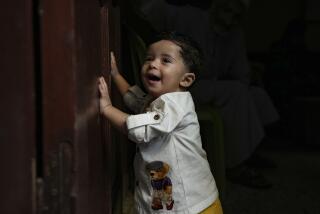The Hardest Goodby : For First Time, Both Parents Could Be Placed Near Combat --and Relatives in the U.S. Could Be Left With War Orphans
- Share via
Michelle Thomas has been saving a videotape of her son’s birth to show her husband, Joe, an Army specialist who has been refueling trucks in Saudi Arabia since she was eight months pregnant.
The tape came out of storage this week, but it wasn’t for the happy family reunion the young Silver Lake mother had dreamed of. Instead, she appeared on camera again--this time to record an emotional farewell to her only child.
“I want him to know that I love him and that I didn’t do this on purpose,” Thomas said, cradling the 10-week-old infant in her arms as images of Saddam Hussein flickered on a living room television.
Thomas, a 21-year-old Army private, was one of 20,000 Army reservists called to active duty under an executive order issued by President Bush two days after war erupted in the Persian Gulf. It was the first involuntary call-up of so-called individual ready reserves--those not attached to particular units--since the Vietnam War and the largest such activation since the Berlin crisis of 1961.
Tiny Raymond Joseph Thomas, who just learned to giggle to his father on the phone and recently rolled over for the first time, certainly would not be the first child left without parents by the massive U.S. military buildup in the Middle East. The Pentagon says thousands of children have been placed in the care of relatives and friends since the first U.S. troops were sent to Saudi Arabia six months ago.
But with fighting growing fiercer and the prospect of heavy casualties very real, the Pentagon’s decision to activate both parents in some families has brought a deep sense of horror to their loved ones.
Never before have Americans faced the prospect of raising a generation of war orphans.
“No place in the military, no place in Saudi Arabia is safe,” said Martin Burns, Michelle Thomas’ stepfather. “When a chemical weapon hits, it can wipe out somebody in the rear guard as easily as it can the grunt on the front line. So just by being there, she is at equal risk as her husband. That just scares the hell out of me.”
Just four months ago, the Army discharged Thomas from her job--ordering truck parts in Frankfurt, Germany--because she was pregnant, but the Mailgram she received last week said she should expect to serve up to 12 more months of active duty. Thomas was ordered to report to Ft. Lee, Va., by Thursday, but the Army has given her a last-minute extension of two weeks because of the baby.
“We are finding that we have to make adaptations to the procedures,” said Army Reserve spokeswoman Joyce Wiesner. “Way back in 1961, there weren’t that many women in the reserves. This question of people with small children . . . is a much larger factor whether people are deployable now than it would have been 30 years ago.”
The extension does not mean that Thomas can stay home with her son indefinitely. Thomas--and hundreds of other reservists granted extensions this week--must convince a three-member Army appeals panel in St. Louis that they deserve a permanent hardship exemption. And that, military officials caution, will not be easy.
“Separation from family would be considered normal and wouldn’t be a hardship,” said Wiesner, adding that no special exemptions exist for families with both parents in the military. “For pregnant women, they are given a 42-day recovery period (after giving birth).”
Military officials say they are sensitive to families’ concerns, but regard them as a predictable byproduct of an all-volunteer military that includes among its ranks unprecedented numbers of women and married couples. Women make up about 11% of the military--including nearly 18,000 single mothers--and there are more than 52,000 couples.
“It is the first time that we are deploying moms,” said Maj. Doug Hart, a spokesman for the Department of Defense. “But women have fought for and have received equal rights in the military. All members of the military, except women who are actually pregnant, must be deployable worldwide.”
Sen. John Heinz (R-Pa.), responding to stories about children with both parents deployed in the Persian Gulf, introduced legislation Thursday that would prohibit such deployments, unless the parents request it. Heinz said the deployments are creating unnecessary risk and anxiety for children of military families.
“Few, I think, could have foreseen a war of the scale of the effort against Iraq, in which both mother and father would find themselves in areas of imminent danger,” Heinz said. “It is hardly just or equitable that we punish our volunteers by pitting the call of duty against the needs of our children.”
So far, reaction from the Pentagon and elsewhere on Capitol Hill “has not been positive,” a Heinz aide said. Hart, the Defense Department spokesman, would not comment on the legislation, but he emphasized the commitment all military personnel make when they enlist.
“A person who joins the military does so voluntarily,” he said. “People are aware of the obligations before they join.”
Michelle Thomas does not disagree. Her father was a soldier in Vietnam, and she does not regard herself as unpatriotic. She said she knows that she has an obligation, and she intends to fulfill it. She just wants more time.
“If it wasn’t for him, I wouldn’t mind so much,” Thomas said, working a small bottle of baby formula into Raymond’s mouth. “It would be more like an adventure. . . . I understand they need all of the soldiers they can get. But I just had a baby, you know, and my baby needs somebody here to be with him.”
Thomas spent the day at home giving her mother, Nancy Burns, a refresher course in infant care. There were lessons on how to install the car seat, what diapers to use and what formula to feed Raymond when he begins to cry at 2 a.m. Thomas also visited an attorney to write her will and to give her mother official responsibilities as guardian.
All of this has left Burns with a heavy heart. She is thankful that she can help her daughter by caring for the baby, but she is also angry at a system that may leave her with an orphan grandchild.
“You are yanking apart family structures here,” said Burns, a self-described peace activist who did not approve of her daughter joining the Army. “If they keep her for 12 months, he will be 14 months old when she gets back. He needs his mom or his dad. We love him, but we are not his parents. I know they are taking everybody’s sons and daughters, but I think it is really bad when they take both parents to war.”
Thomas joined the Army when she was 19 because she was bored and she wanted to get away from friends who were using drugs. In enlisting, she agreed to set aside eight years of her life for the military, but she admits she never thought about being sent to war.
After six months of training and active duty in the United States and 18 months in Germany, Thomas married a fellow soldier, got pregnant and moved back to Silver Lake to have her baby. Her husband left Germany, too, but was almost immediately deployed to Dhahran, Saudi Arabia.
Since Raymond was born in November, Thomas has not been away from him for more than two hours at a time. She cannot remember what life was like without a baby. She looks into Raymond’s tiny blue eyes, and she sees her husband, Joe. “He has got his mouth, too,” she gushed. “He has a perfect little bow-shaped mouth.”
Thomas flirted with the idea of running away. Her stepfather even called the Canadian Embassy, but he was told AWOL Americans would not be welcome north of the border. The idea of living on the run did not sound like a healthy way to raise a child anyway, she confessed.
Joe Thomas, who has exchanged videotaped greetings with his wife courtesy of one of the television networks, does not know that she has been called to active duty and could eventually join him in the Persian Gulf. Michelle Thomas wrote to him last week when she got the Mailgram, but she has not heard from him since war erupted and he was moved out of Dhahran.
Thomas knows that her husband will be angry--he did not even want her working in Germany when she was pregnant--but she holds out hope that the next time they talk she will be able to explain it was all a mistake. In the meantime, her mother and stepfather are looking after the videotape she made this week for her son.
“God forbid, it ever has to be played,” Martin Burns said.
More to Read
Sign up for Essential California
The most important California stories and recommendations in your inbox every morning.
You may occasionally receive promotional content from the Los Angeles Times.













